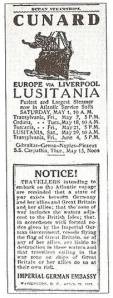Let me begin by stating that I am by no means an individual opposed to all war. There are clearly times in which a nation needs to defend itself, and there are even situations when preventative measures need to be taken to save American lives. This is not an anti-war post – I am merely trying to foster a discussion. Feel free to comment, even if you disagree. Don’t hesitate to share this with others using the tools below – the goal is to facilitate a discussion on what is, in my opinion, the most important topic in our nation’s history. Our involvement in previous foreign entanglements and wars has a direct correlation to our nation’s future due to our failure to learn and ask questions.
Students of history for some reason have no issue coming to grips with the fact that monarchs and dictators throughout Europe and Asia in the distant past used their armies to defeat foreign opponents to gain territory, resources, slaves, wealth, or even to feed their own selfish pride. What is confusing to me is why we as Americans, for the most part, believe this practice to be outdated and old fashioned. Why is that we can so readily believe that leaders in the past, who clearly were filled with enough ego and ambition to ascend to such positions of power, could do such things, yet we believe that world leaders today are so… different? The goals of warfare in many situations have changed very little over the span of human history – as has, apparently, our gullibility. One would think with the access to technology and information that the vast majority of the world is afforded would alter this, but sadly it has not.

William McKinley waged war on the Philippines because God wanted us to save those heathen savages from themselves, not because we wanted them as a colony.
When one looks back at our involvement in numerous of our foreign altercations, you get the sense that the American people are almost willingly duped into blindly following the tide of the times. I won’t go into great detail due to a fear of boring anyone (which again says a lot about American culture), but let’s go through some examples.
The Mexican-American War’s causes can be traced to our desire to obtain the southwest, including Texas and California. There was a dispute between Mexico and the United States over where the boundary lay – Mexico claimed all along it was the Nueces River; President James Polk claimed it was the Rio Grande (about 150 miles south of where the Mexicans claimed). Polk sent in over 10,000 troops to the disputed area. When Mexico reacted by defending what it believed to be its territory, Polk went to Congress and drummed up American outrage by saying that American blood had been shed on American soil. After a short (and by short I mean a few hours) debate in Congress, off we went to war. Americans believed they were fighting to defend our nation in the face of a bold and ruthless attack – and we just happened to gain valuable territory as a result.
In the Spanish American War, the battleship Maine was sent to Cuba to “oversee” the revolution going on as Cubans struggled for their freedom from Spain. Yes, this is the famous situation you learned about in your high school history class where a “war” between rival newspaper publishers exaggerated stories to increase support for American intervention on behalf of the Cubans. Of course, their newspaper sales and valuable American business ties on the island also helped encourage the desire for us to act. When the Maine exploded, it was the Spanish who came out in lifeboats to help survivors. This was never mentioned at the time, nor did the newspapers wait to gather evidence as to what caused the accident. The Spanish made for easy scapegoats, and the American people were eager to “remember the Maine!” Despite our cause being the freedom of Cuba, we found time to invade and “liberate” the Philippines. We also gained Puerto Rico and Guam as a result of our effort to free the Cubans. Not bad!
When the Philippines realized that we weren’t interested in their freedom and that we meant to stay, they began arming and preparing to revolt against their new potential owners. When the vote went to Congress as to whether or not we should officially annex the Philippines, American troops were ordered closer to the Filipino “insurgents” camps. It had been decided that we could not risk losing such a valuable source of resources and a colony so close to China. When a Filipino guard ordered the American skirmisher to halt, the American fired and killed him. Word was quickly sent back to Washington about the ruthless “attack” carried out upon our troops… and off we went to war. Americans were told that they were a heathen nation that needed us to Christianize them. For some reason, this war is rarely discussed in classrooms – maybe it has something to do with the fact that we slaughtered hundreds of thousands of Filipino civilians in an effort to suppress this rebellion. For a country that so loves the idea of a revolution for freedom, we seemed to have no issue waging war for years on these islands. We did, however, set them free at the conclusion of World War II.
We can go on… Our entry into World War I, after years of avoiding it, had ties to a British passenger liner named the Lusitania being hit by a torpedo from a German U-boat. Over 1,000 civilians perished, including over 100 Americans. Outcry against the savage tactics of the Germans was rampant in the American press. Of course, usually no one mentions that when the war began German submarines came to the surface to allow merchant ships to evacuate before sinking them. This practice had to change when then Lord of the Admiralty Winston Churchill ordered hidden artillery be put on the unarmed merchant ships so they could sink U-boats that came to the surface. The Germans responded by sinking ships without warning. It is widely believed that the Lusitania was carrying weapons and munitions from the “neutral” United States back to England, thus throwing into question whether or not the passengers were unwittingly serving as shields. This was never mentioned in the press or in government propaganda that was too busy using the incident as a reason to rally support the war… nor is it usually mentioned that Germany took out a warning in the newspaper telling civilians not to ride on the liner.
 Vietnam can be debated on many levels – did we really need to stop communism from spreading? Because if we didn’t, then after they defeated the French at Dien Bien Phu and earned their freedom… why interfere and divide them? And when that didn’t work, the Gulf of Tonkin “incident” was used by President Lyndon Johnson to get the Gulf of Tonkin Resolution passed overwhelmingly by Congress, allowing him to do anything besides use nuclear weapons to save South Vietnam… reports released in the last decade indicate the attacks in the Gulf of Tonkin probably never even happened at all. But hey, that happened 47 years ago. Who cares now, right?
Vietnam can be debated on many levels – did we really need to stop communism from spreading? Because if we didn’t, then after they defeated the French at Dien Bien Phu and earned their freedom… why interfere and divide them? And when that didn’t work, the Gulf of Tonkin “incident” was used by President Lyndon Johnson to get the Gulf of Tonkin Resolution passed overwhelmingly by Congress, allowing him to do anything besides use nuclear weapons to save South Vietnam… reports released in the last decade indicate the attacks in the Gulf of Tonkin probably never even happened at all. But hey, that happened 47 years ago. Who cares now, right?
And the War in Iraq… I mean really. They have WMD. Oops. We meant they had ties to Al-Qaeda. Oops. We meant we wanted to give them freedom so we can set up the first democracy in the Middle East.
This can only stop once the American people are willing to ask questions – questions they, by the power given in the Bill of Rights, have the right to ask. That’s one of the many reasons why this country IS better than many others. It isn’t unpatriotic to ask questions that could potentially save young American lives from being lost in wars.
Sadly, the vast majority of Americans seem to believe that is exactly the case – that it would be unpatriotic. We also have this inherent belief that America is above doing wrong. Other countries are completely capable of waging war over trumped up charges or for the wrong reasons, but not this “city upon a hill.” We’re better than that. The only question that remains is: when and where will we get involved next, and will history show us that yet again it was for a hidden cause?
By all means, comment.

